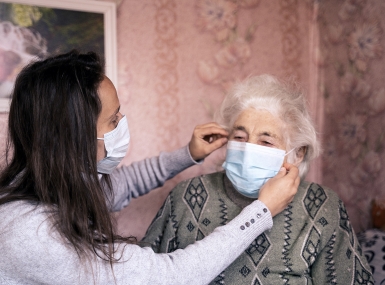House Ways and Means Committee passes bill blocking proposed CMS nursing home minimal staffing rule
Author

Blaire Bryant

Naomi Freel
Upcoming Events
Related News

Key Takeaways
On March 5, the U.S. House of Representatives Committee on Ways and Means marked up and reported out of committee the Protect America’s Senior’s Access to Care Act (H.R. 7513). If signed into law, this legislation would block the Center for Medicare and Medicaid (CMS)’s ability to finalize a rule establishing minimum staffing levels for skilled nursing facilities.
CMS minimum staffing standards rule
In September 2023, CMS issued a proposed rule that would impose minimum staffing standards on facilities that participate in Medicaid or Medicare. Key highlights of the proposed rule include:
- Requires long-term care facilities to have an average daily nurse staffing level equivalent to at least 0.55 hours per resident, or one registered nurse for every 44 residents
- Requires 2.45 nurse aide hours per resident per day, or approximately one aide for every 10 residents
- Requires at least one registered nurse to be on site 24 hours a day, seven days a week
- Does not include new funding for additional staff but sites recent workforce incentive initiatives under HHS
- Includes a “hardship exemption” which exempts the facility from punitive assessments for up to 1 year
Explore NACo's Blog on the Proposed Rule
What is NACo doing?
NACo supports the passage of H.R. 7513 and vocally opposes CMS’s finalization of the proposed rule on nursing home staffing minimums without further modification. In November, NACo submitted a letter to the U.S. Department of Health and Human Services (HHS) and CMS advocating county-owned and operated long-term care facilities and requesting significant changes to the proposed rule.
Additional resources

The County Role In Long-Term Care
Learn about counties’ essential role in administering long-term care facilities and community-based services for older adults and individuals with disabilities, and explore federal policy recommendations to strengthen county long-term care infrastructure.

NACo Brief: Nursing Homes & COVID-19
Now more than ever, counties are making significant investments in health and human services while also providing critical services to protect and enhance the lives of our nation's vulnerable populations.
Related News

White House Executive Order establishes national substance use disorder response
On January 29, the White House issued an Executive Order (EO) establishing the Great American Recovery Initiative, a new federal effort aimed at coordinating a national response to substance use disorder (SUD).

USDA and HHS release new dietary guidelines
On January 7, U.S. Department of Agriculture Secretary Brooke Rollins and U.S. Department of Health and Human Services Secretary Robert F. Kennedy, Jr. unveiled the new Dietary Guidelines for Americans, 2025–2030.

SAMHSA cancels, reinstates thousands of behavioral health grants
Late on Wednesday, January 14, the Administration announced that thousands of Substance Abuse and Mental Health Services Administration (SAMHSA) grants that had been terminated just one day earlier would be reinstated.